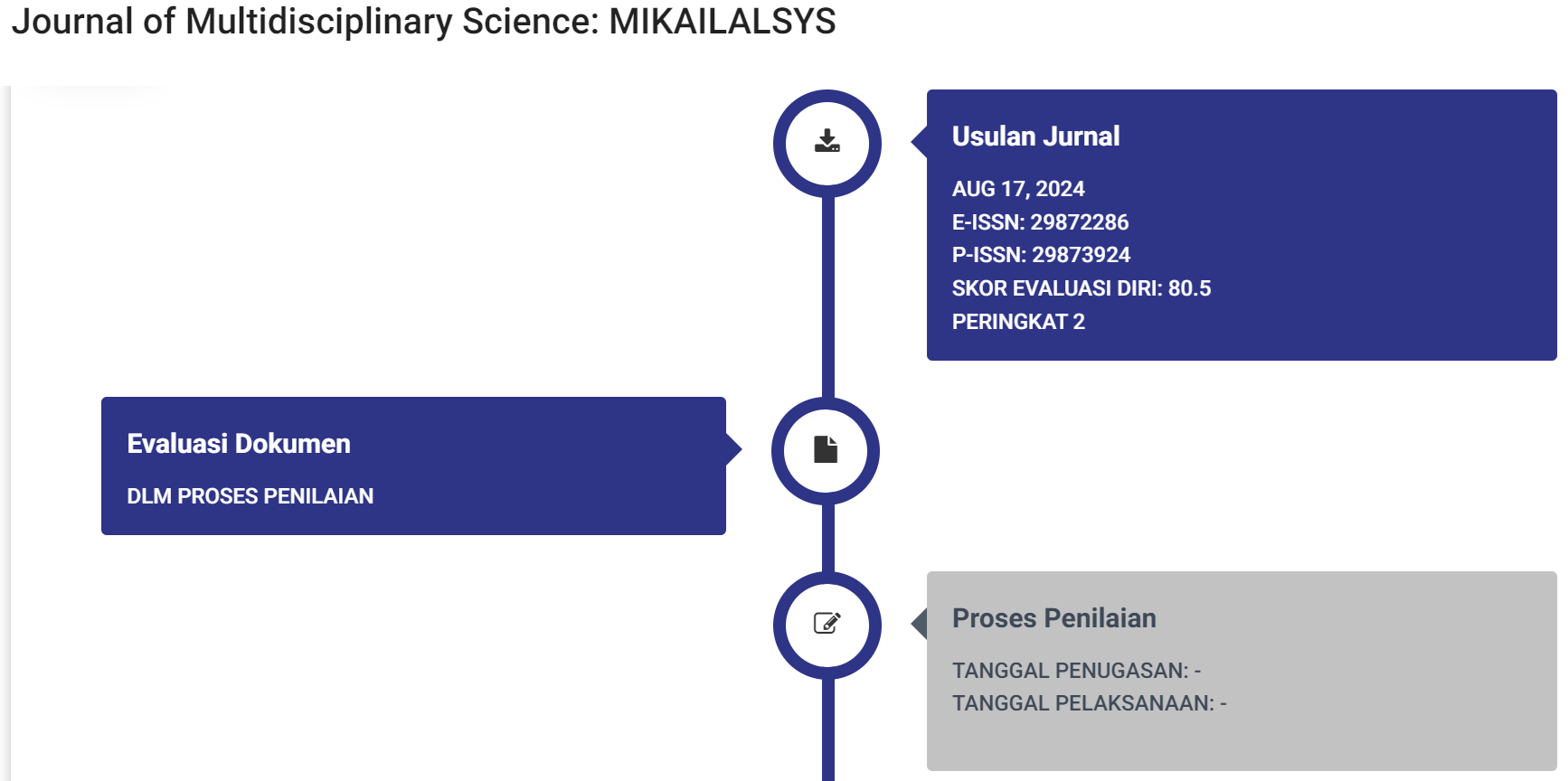Maternal Health Information Access and Utilization among Pregnant Women in Rural Communities of Jalingo, Taraba State, Nigeria
 Digital Object Identifier:
10.58578/mikailalsys.v2i3.3769
Digital Object Identifier:
10.58578/mikailalsys.v2i3.3769
Please do not hesitate to contact us if you would like to obtain more information about the submission process or if you have further questions.

Abstract
This study aimed to investigate how pregnant women in rural communities in Jalingo, Taraba State, access and utilise maternal health information, as well as the challenges they encounter in this process. Drawing from the health belief model, a qualitative approach was employed, involving in-depth interviews with 25 participants. The data collected were thematically analysed, and the findings revealed that pregnant women primarily access maternal health information from hospitals and clinics, gaining knowledge on childbirth preparation, nutrition, exercise, and pregnancy risks. However, they face challenges including overcrowded hospitals, poor staff attitudes, language barriers, and transportation issues. The study recommends that the government should improve its infrastructure and services in public hospitals and rural clinics to accommodate the large number of women seeking maternal health information and services, implement language interpretation services, utilise diverse information dissemination channels, establish mobile clinics to take maternal health services into rural communities, foster community awareness, and support networks for maternal health issues.




Citation Metrics:

Downloads

Authors retain copyright and grant the journal right of first publication with the work simultaneously licensed under a Creative Commons Attribution-NonCommercial-ShareAlike 4.0 International License that allows others to share the work with an acknowledgement of the work's authorship and initial publication in this journal.
References
Becker, M. H. (1974). The health belief model and sick role behavior. Health Education Monograph, 2:409-419.
Carpenter, C.J. (2010) A Meta-Analysis of the Effectiveness of Health Belief Model Variables in Predicting Behavior. Health Communication, 25, 661-669.
http://dx.doi.org/10.1080/10410236.2010.521906
Glanz, K., Lewis, F. M., & Rimer, B. K. (eds.). (1990). Health Behavior and Health Education: Theory, Research, and Practice. San Francisco: Jossey-Bass.
Glanz, K., Rimer, B. K., & Viswanath, K. (Eds.). (2008). Health behavior and health education: theory, research, and practice. John Wiley & Sons.
Harrison, J. A., Mullen, P. D., & Green, L. W. (1992). A meta-analysis of studies of the health belief model with adults. Health Education Research, 7, 107–116.
Igbinoba, A. O., Soola, E. O., Omojola, O., Odukoya, J., Adekeye, O., & Salau, O. P. (2020). Women’s mass media exposure and maternal health awareness in Ota, Nigeria. Cogent Social Sciences, 6(1). https://doi.org/10.1080/23311886.2020.1766260
Janz, N. K., Champion, V. L., &Stretcher, V. J. (2002). "The Health Belief Model ." In Health Behavior and Health Education, edited by K. Glanz, B. K. Rimer, and F. M. Lewis.New York: John Wiley, 45-66.
Janz, N. & Becker, M.H. (1984). The health belief model: a decade later, Health Education Quarterly,11, 1-47.
Kassim, M & Katunzi-Mollel, K.R. (2017). Seeking health information in rural context: Exploring sources of maternal health information in rural Tanzania. University of Dar es Salaam Library Journal, 12, 2, pp-37-61.
Onwujekwe, O., Ezumah, N., Mbachu, C. et al. Exploring effectiveness of different health financing mechanisms in Nigeria; what needs to change and how can it happen?. BMC Health Serv Res 19, 661 (2019). https://doi.org/10.1186/s12913-019-4512-4
Musiimenta, A., Tumuhimbise, W., Atukunda, E. C., Ayebaza, S., Kobutungi, P., Mugaba, A. T., Asasira, J., Mugyenyi, G. R., Katusiime, J., Zender, R., Pinkwart, N., & Haberer, J. (2022). Challenges in accessing maternal and child health services during COVID-19 and the potential role of social networking technologies. Digital Health, 8, 205520762210867. https://doi.org/10.1177/20552076221086769
Nwagwu, W. E., & Ajama, M. (2011). Women's health information needs and information sources: a study of a rural oil palm business community in South - Western Nigeria. Annals of Library and Information Studies, 58, 270-281.
Obasola, O. I., & Mabawonku, I. M. (2018). Mothers’ perception of maternal and child health information disseminated via different modes of ICT in Nigeria. Health Information and Libraries Journal, 35(4), 309–318. https://doi.org/10.1111/hir.12235
Parwati, N. M., Bakta, I., Januraga, P., & Wirawan, I. M. (2021). A Health Belief Model-Based Motivational Interviewing for medication adherence and Treatment success in pulmonary tuberculosis patients. International Journal of Environmental Research and Public Health/International Journal of Environmental Research and Public Health, 18(24), 13238. https://doi.org/10.3390/ijerph182413238
Rahman A, Leppard M, Rashid S, Jahan N, Nasreen HE. (2016). Community perceptions of behaviour change communication interventions of the maternal neonatal and child health programme in rural Bangladesh: an exploratory study. BMC Health Serv Res. 16;16(a):389. doi: 10.1186/s12913-016-1632-y.
Radoff KA, Levi AJ, Thompson LM. (2013). A radio-education intervention to improve maternal knowledge of obstetric danger signs. Rev Panam Salud Publica. 34(4):213-9. PMID: 24301731.
Ramanadhan, S., & Viswanath, K. (2006). Health and the information nonseeker: A profile. Health Communication, 20(2), 131 - 139.
Rosenstock, I. M. (1974). Historical origins of the health belief model. Health Education Monograph, 2, 328-335.
Saleh, A. G., & Lasisi, F. I. (2011). Information needs and seeking behaviour of rural women in Borno State, Nigeria. Library Philosophy and Practice (e-journal)
Song, F. W., West, J. E., Lundy, L., & Dahmen, N. S. (2012). Women, Pregnancy, and Health Information Online. The Making of Informed Patients and Ideal Mothers. Gender & Society, 26(5), 773-798.
Thassri, J., Kala, N., Chusintong, L., Phongthanasarn, J., Boonsrirat, S., & Jirojwong, S. (2000). The development and eval_uation of a health education programme for pregnant women in a regional hospital, southern Thailand. Journal of Advanced Nursing, 32(6), 1450-1458.
UNICEF (2023). Infant, under-five and maternal mortality rates. https://www.unicef.org/nigeria/media/1636/file/Nigeria-equity-profile-health.pdf
World Health Organization (2023). Maternal mortality. https://www.who.int/news-room/factsheets/detail/maternal-mortality.

























